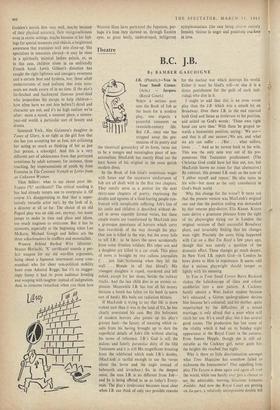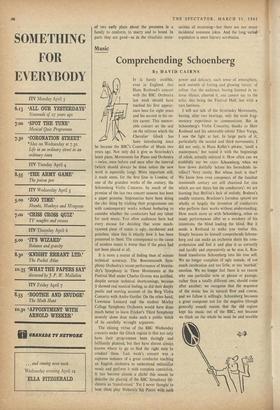Theatre
B.C. J.B.
By BAMBER GASCOIGNE J.B. (Phoenix.)—You in Your Small Corner. (Arts.) — Jacques. (Royal Court.) WHEN a serious poet uses the Book of Job as the basis for a modern play, one expects a powerful comment on twentieth-century life. But J.B., once one has stripped away the pre- tensions of its poetry and the theatrical gimmickry of its form, turns out to be a meagre and meaningless piece of sen- sationalism. MacLeish has merely fitted out the bare bones of his original in the most garish modern dress.
In the Book of Job God's monstrous wager with Satan and the successive misfortunes of Job are all dealt with in the first two chapters. They merely serve as a pretext for the next thirty-nine chapters of poetry, expressing the doubts and agonies of a God-fearing people con- fronted with inexplicable suffering. Job's loss of his cattle and children is described without de- tail in seven superbly formal verses, but these simple events are transformed by MacLeish into a grotesque panorama of horrors which carry him two-thirds of the way through his play. One son is killed in the war, but the army fails to tell J.B.: so he hears the news accidentally from some drunken soldiers. His other son and a daughter are killed in a car crash. This piece of news is brought by two callous journalists ('. . just kids/Screaming when they hit the wall. . . . Blonde in all that blood'). His youngest daughter is raped, murdered and left naked, except for her shoes, beside the railway tracks. And the last child dies in an atomic ex- plosion. Meanwhile J.B. has lost all his money because a bomb has fallen on his bank (a naïve sort of bank). His boils are radiation blisters.
If MacLeish is trying to say that life is more violent now than it was in the land of Uz, he has clearly overstated his case. But this holocaust of modern horrors also points up his play's gravest fault—the fatuity of meaning which re- sults from his having brought up to date the superficial details of Job's life without altering his terms of reference. J.B.'s God is still the jealous and faintly paranoiac deity of the Old Testament and it is still His magnificent boasting from the whirlwind which ends J.B.'s doubts.
(MacLeish is tactful enough to use the verses about the horse and the eagle instead of behemoth and leviathan.) So, in the deepest sense, the man J.B. is no different from Job— and he is being offered, to us as today's Every- man- The play's irrelevance becomes most clear when J.B. can think of only two possible reasons for the nuclear war which destroys his world. Either it must be God's will—or else it is a direct punishment for the guilt of each indi- vidual who dies in it.
1 ought to add that this is an even worse play than the J.B. which was a smash hit on Broadway. Over there J.B. in the end rejected both God and Satan as irrelevant to his position, and seized on God's words: 'Thine own right hand can save thee.' With these he groped to- wards a humanistic position, saying: 'We are— and that is all our answer./We are, and what we are can suffer . . ./But . . . what suffers, loves. . . .' And so he turned back to his wife.
This was the only sane way out of his pre- posterous Old Testament predicament. (The Christian God could have led him out, too, but MacLeish leaves no room for that alternative.) By contrast, this present J.B. ends on the note of 'I abhor myself and repent.' He also turns to his wife—but more as the only consolation in God's bleak world.
Why this change for the worse? It turns out that the present version was MacLeish's original one and that the positive ending was demanded by that veteran play-doctor, Elia Kazan. Kazan must derive a gruesome pleasure from the sight of his playwrights trying out in London the original versions of their successful Broadway plays, and invariably finding that his changes were right. Precisely the same thing happened with Cat on a Hot Tin Roof a few years ago, though that was merely a question of the dramatic effect. These changes go much deeper. In New York J.B. rejects God—in London he bows down to Him in repentance. It seems odd that a serious playwright should tamper so lightly with his meaning.
In You in Your Small Corner Barry Reckord shakes the kaleidoscope of class and colour snobberies into a new pattern. A Cockney family admire a West Indian student because he's educated; a Girton undergraduate desires him because he's coloured; and his mother, quite unperturbed by the difficulties of a mixed marriage, is only afraid that a poor white will catch her son. It's a small play, but it has several good scenes. The production has lost some of the vitality which it had on its Sunday night appearance at the Royal Court in the autumn.
Even Jeanne Hepple, though she is still ad- mirable as the Cockney girl, never quite hits the heights she reached that night.
Why is there so little discrimination amongst what Time Magazine has somehow failed to nickname the lonescoterie? That appalling little play The Lesson is done again and again all over the world, while one hardly ever gets a chance to see the admirable, moving, hilarious, fantastic Amddee. And now the Royal Court are putting on Jacques, a relatively unimpressive double bill of two early plays about the pressures in a family to conform, to marry and to breed. In parts they are good—as in the ritualistic insin- cerities of mourning—but there are too many incidental nonsense jokes. And the long verbal copulation is mere literary acrobatics.



































 Previous page
Previous page